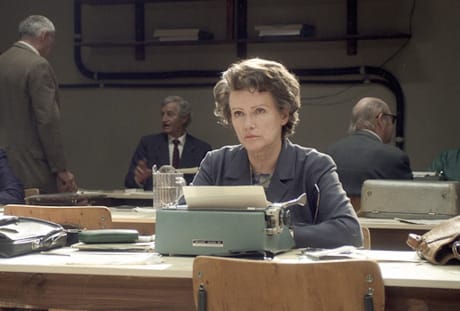Having already established her knack for making a compelling academic and philosophical narrative from the life of a challenging historical figure with Vision, which was about medieval visionary Hildegard von Bingen, German director Margarethe von Trotta's biopic about political theorist Hannah Arendt solidifies her as a master of the genre.
Drawing parallels throughout history as they pertain to Arendt's life, von Trotta has again constructed a straightforward, yet complex work of accessible philosophical ruminations, free from heavy pretence or exposition, with Hannah Arendt.
Its structure is simple enough, mentioning briefly Arendt's (Barbara Sukowa) background as a German-Jew forced to flee France for America in the early '40s during the German military occupation, while grounding itself just prior to her work writing about the Adolf Eichmann trial for The New Yorker. Agreeing to cover the trial against the better judgement of Marxist husband Heinrich Blücher (Axel Milberg), she ultimately turns it into a political manifesto about the nature of evil and human complacency in Nazi Germany.
Aside from detailing some of Arendt's lecturing styles and socio-political concepts, the timeline never escapes the Eichmann trial period of her life, save for some flashbacks that allude to her affair with Martin Heidegger, who is always talking about thinking as a construct not acted upon.
Discussing the banality of power in relation to ex-Nazi Eichmann in her article, she implies that he was merely a bureaucrat guilty primarily of not thinking. Even more controversial than her indirect defence of the Nazi war criminal was her implication that the reason so many Jews were sent to concentration camps was complacency amongst their leaders at the time.
While her broad intentions were to state that ostensibly everyone was guilty for allowing the totalitarian construct of Nazi Germany to come about in the first place, New York Jews were understandably upset about the superficial implications of her statement, which is where the conflict and drama of this film stem from.
Receiving death threats and alienating a number of close, personal friends in the process, von Trotta compares the wide misinterpretation and emotional reaction of Arendt's writings to the same banality of thought, or ignorance, demonstrated by Eichmann. In such, the question then becomes one of logical interpretation of human motivations free from emotional response.
This clever thematic integration of Arendt's beliefs with a narrative about her life is just part of what makes this intelligent academic thriller superlative fare. It's the positioning of a timeless ideology as a parable on the dangers of hopping on bandwagons simply because they are populist that makes this intelligent work exceedingly relevant and inspiring.
(Match Factory)Drawing parallels throughout history as they pertain to Arendt's life, von Trotta has again constructed a straightforward, yet complex work of accessible philosophical ruminations, free from heavy pretence or exposition, with Hannah Arendt.
Its structure is simple enough, mentioning briefly Arendt's (Barbara Sukowa) background as a German-Jew forced to flee France for America in the early '40s during the German military occupation, while grounding itself just prior to her work writing about the Adolf Eichmann trial for The New Yorker. Agreeing to cover the trial against the better judgement of Marxist husband Heinrich Blücher (Axel Milberg), she ultimately turns it into a political manifesto about the nature of evil and human complacency in Nazi Germany.
Aside from detailing some of Arendt's lecturing styles and socio-political concepts, the timeline never escapes the Eichmann trial period of her life, save for some flashbacks that allude to her affair with Martin Heidegger, who is always talking about thinking as a construct not acted upon.
Discussing the banality of power in relation to ex-Nazi Eichmann in her article, she implies that he was merely a bureaucrat guilty primarily of not thinking. Even more controversial than her indirect defence of the Nazi war criminal was her implication that the reason so many Jews were sent to concentration camps was complacency amongst their leaders at the time.
While her broad intentions were to state that ostensibly everyone was guilty for allowing the totalitarian construct of Nazi Germany to come about in the first place, New York Jews were understandably upset about the superficial implications of her statement, which is where the conflict and drama of this film stem from.
Receiving death threats and alienating a number of close, personal friends in the process, von Trotta compares the wide misinterpretation and emotional reaction of Arendt's writings to the same banality of thought, or ignorance, demonstrated by Eichmann. In such, the question then becomes one of logical interpretation of human motivations free from emotional response.
This clever thematic integration of Arendt's beliefs with a narrative about her life is just part of what makes this intelligent academic thriller superlative fare. It's the positioning of a timeless ideology as a parable on the dangers of hopping on bandwagons simply because they are populist that makes this intelligent work exceedingly relevant and inspiring.
